Many condoms made overseas are not allowed to be imported into the US. Why is that? Let’s explore some of the reasons why American residents can’t purchase certain condoms and discuss the condoms we’d love to have here in the States.
The Comstock Act
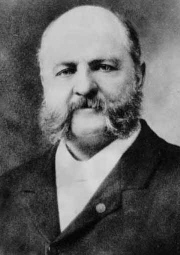 Back in the 1800’s, an activist named Anthony Comstock was a tireless crusader for anti-obscenity laws. Much like today’s war on drugs, Comstock would stage “buy and bust” set-ups in order to seize obscene materials. The Comstock Act of 1873 banned the mailing of contraceptives and contraceptive information by mail and made it illegal to manufacture and sell condoms in 30 different states in the US. The Comstock Act also prohibited the import of contraceptive devices such as condoms.
Back in the 1800’s, an activist named Anthony Comstock was a tireless crusader for anti-obscenity laws. Much like today’s war on drugs, Comstock would stage “buy and bust” set-ups in order to seize obscene materials. The Comstock Act of 1873 banned the mailing of contraceptives and contraceptive information by mail and made it illegal to manufacture and sell condoms in 30 different states in the US. The Comstock Act also prohibited the import of contraceptive devices such as condoms.
This time in history is often referred to as “the great condom prohibition.” As early as 1906, patents for less expensive American made rubber condoms were being approved under the guise of them being purely a disease preventative, not a contraceptive device. Having such stringent rules and laws against the importation of condoms during this time lead to an increase in the amount of domestic condom manufacturing here in the States. Brands such as Trojan began producing American-made condoms shortly after this, in 1916.
FDA and Condoms
The FDA is a government-run organization designed to protect US citizens from fraudulent product claims and misrepresented merchandise made domestically and internationally. The FDA classifies condoms as a Class II medical device, so condoms are subject to intense examination and scrutiny under the eyes of the law.
The FDA has particularly strict regulations on the importation of condoms,“If it appears from the examination of such samples or otherwise that … the methods used in, or the facilities or controls used for, the manufacture, packing, storage, or installation of the device do not conform to the requirements,” the shipment will be seized and unavailable for sale. Condoms imports are also denied entry into the States by the FDA if the packages are misbranded or adulterated in any way or if they have an unacceptable amount of defects present.
Some extremists have accused the FDA of regulatory capture, which means that the FDA intentionally seizes specific condom imports and not others for their own gain. No proof of this has surfaced and since the FDA is a non-profit organization, it seems unlikely that this is indeed the case.
Condoms We’d Love to Have in the USA:
Okamoto Polyurethane .002
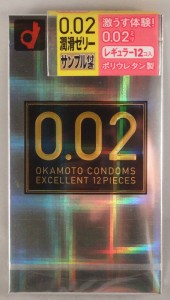
For those with an allergy to latex, or an aversion to the smell and taste of latex, the idea of a thin polyurethane condom being imported seems heavenly. Okamoto claims that this condom transmits heat more effectively than traditional latex condoms, which are about twice the thickness of the .002. As of right now, the .002 is approved for sale in Singapore, but has not met or exceeded FDA standards. For an FDA approved version available in the US, try Trojan Supra Bareskin Non-Latex condoms made from polyurethane.
Okamoto .003
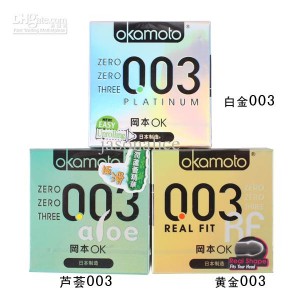 .003 Platinum: These condoms are super thin and have no rubber odor. Okamoto claims they are easier to unroll than a traditional latex condoms. For an FDA approved version available in the US, try Okamoto .004 condoms, which are just one thickness up from the .003 Platinum. .003 Real Fit: These are specifically constructed to hug the natural contours of a penis. They do not have a rubbery smell and supposedly unroll with great ease. For an FDA approved version available in the US, try Durex Extra Sensitive condoms, which have a similar contoured shaped as the .003 Real Fit.
.003 Platinum: These condoms are super thin and have no rubber odor. Okamoto claims they are easier to unroll than a traditional latex condoms. For an FDA approved version available in the US, try Okamoto .004 condoms, which are just one thickness up from the .003 Platinum. .003 Real Fit: These are specifically constructed to hug the natural contours of a penis. They do not have a rubbery smell and supposedly unroll with great ease. For an FDA approved version available in the US, try Durex Extra Sensitive condoms, which have a similar contoured shaped as the .003 Real Fit.
.003 Aloe: This condom boasts a unique aloe-based lubricant which allegedly, “takes the notion of smooth to another level.” Okamoto claims this condom leaves no residue on the skin and is less messy than traditional condoms. They also say that aloe prevents irritation and maintains moisture during sex. For an FDA approved version available in the US, try Beyond Seven Aloe, made with the same aloe based lubricant as the .003 Aloe. If you’d like to add any additional aloe lubricant to your condom, try using Lifestyles Aloe water-based lubricant.
Okamoto Harmony Vibra Ribbed
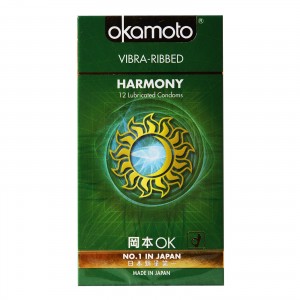
The Vibra Ribbed condom boasts multiple horizontal layers of ribs which are designed to please both partners.
Okamoto describes this condom as “doubling the friction for maximum intensity.” For an FDA approved version available in the US, try Kimono Ribbed condoms, which have both ribs, studs and no shortage of friction.
Sir Richard’s Extra Large Condoms
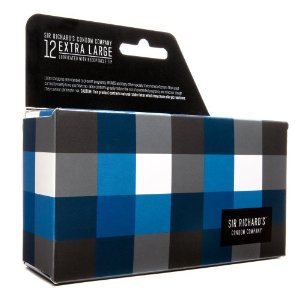
These natural latex condoms are perfect for the larger gentleman who wants superior protection. They do not contain any casein, which is a milk protein that’s found in many other brands of condoms. Therefore, Sir Richard’s condoms are approved by the American Vegetarian Association and are vegan friendly. The lubrication used in Sir Richard’s Extra Large condoms are glycerin, paraben and spermicide-free as well, making them an ideal choice for many people worldwide.
